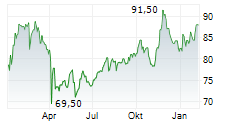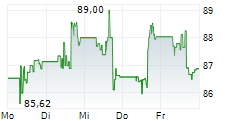
NORTHAMPTON, MA / ACCESSWIRE / August 5, 2024 / Medtronic
Medtronic has taken measurable steps to drive change.
Doctors have used pulse oximeters for more than 40 years, but the pandemic put the devices in the spotlight after studies found they may not be accurate across all skin tones.
"What we saw during the pandemic was health disparities," said Bradley, who works in sales in the Acute Care & Monitoring (ACM) business at Medtronic. "We recognize that patients of color were not faring as well as their lighter skin counterparts."
In her presentations, Bradley, the mother of a multiracial daughter, elaborates on why the devices can sometimes fall short. She calls it "technology bias."
There's a lot we still don't understand about what drives that bias, but we know low perfusion, or the flow of blood to cells and tissues, along with skin pigmentation, and user error, are at the core.1
While our pulse oximeter, Nellcor, has delivered monitoring solutions for decades, Medtronic can do better, ACM President Frank Chan said. It's why the company has taken measurable steps to drive change, such as participating in a U.S. Food and Drug Administration panel on the accuracy of pulse oximeters and opening a physiology lab in a racially diverse neighborhood to ensure inclusive clinical trial enrollment and participation.
"We saw all the studies coming out of the pandemic around equity and pulse oximetry and delivering safe care," said Chief Medical Officer for ACM Dr. Sam Ajizian. "We accelerated our work. In doing so, we aim to do the right thing for the patient."
What is a pulse oximeter?
Dr. Ajizian was a young physician when pulse oximeters were first introduced to the marketplace. They were a "transformative" tool that removed the guesswork in measuring the amount of oxygen in a patient's blood - and alerting doctors when more may be needed.
If you've had surgery, ridden in an ambulance, or even visited a clinic, chances are a pulse oximeter has been clipped to the end of your finger.
"It's kind of magical to be able to take something on the outside of the body and use it to measure how much oxygen is going to the tissue that's contained in the blood on the inside of the body," Dr. Ajizian said.
While pulse oximeters are essential to patient safety, not all are created equal. In a recent study enrolling healthy volunteers to measure the effects of skin pigmentation and perfusion index on pulse oximeter accuracy, one of the company's competitor's devices, for example, missed 30% of hypoxemic events, or when there's an abnormally low amount of oxygen in the blood. Nellcor pulse oximeters, on the other hand, missed 7.9%, said Vice President of Research & Development for ACM Jason Case.1
"The goal isn't to be better than everyone else," Case said. "The goal is to provide a solution that works for everybody. How do we get that 7.9% to zero, independent of if you have thick skin, dark skin, or low perfusion?"
Walking the walk
The commitment to getting it right - every time - is why the company opened a clinical physiology lab near the Five Points neighborhood of Denver, Colorado. It's a racially diverse area where community members can easily access the unassuming lab, which is embedded within a larger medical complex. Many trial participants walk to the lab from their homes.
"We decided to locate this lab in Denver, away from the central offices of Medtronic, and it has proven to be the right choice," said Lab Manager Roger Martin-Pressman. "To make it convenient for people from diverse backgrounds to access these research opportunities was really important to me."
The lab empowers the company to conduct its own clinical trials, meaning it can test devices with more speed and frequency and, in turn, innovate quickly. "We really want devices to get better based on the data we collect here," Martin-Pressman said. "And not just better so clinicians understand how to use them, but also better so that people who wear them have better outcomes."
The larger, more diverse data set being collected at the lab is critical to research and development work at Medtronic, Case said. It ensures we're approaching our work with equity before it leaves the innovation lab.
Building trust
Obioma Nwankwo is a clinical studies coordinator for the clinical physiology lab in Denver. She recruits trial participants and often leads engagement events in the community, such as hosting booths at the city's Juneteenth festival, to build trust within the community and educate about the trials and our commitment to health equity.
"Sometimes the end goal is not always getting someone in the chair and having them come and do the study," Obioma said. "Sometimes the end goal is just spreading awareness, or having a conversation."
But the community is responding; trial enrollment continues to tick upward. The lab has already enrolled more than 130 participants and will continuously recruit. The opportunity to be part of a clinical trial that could improve device accuracy across all skin pigmentations was a driving factor for Zahra Abdullahi to enroll.
"As a minority in the healthcare system, a lot of things are overlooked," said Abdullahi, a college student studying engineering. "I'm doing this not only for my safety, but for others' as well. I have siblings and friends who are also minorities and making sure they have accurate representation in healthcare is very important."
Lasting change
When Bradley first began her career in 1991, working as a respiratory therapist for neonatal and pediatric patients, she would have argued there weren't health disparities in her work.
"When I look retrospectively on it, I recognize that's not true, there probably always were some biases," she said, adding anyone who wants to be "intellectually honest" would agree there are disparities in the access and provision of healthcare.
Even though the Medtronic pulse oximetry device meets all current FDA standards, those questions about health equity are spurring broader change, and Medtronic is making meaningful contributions.
"I'm proud that Medtronic has taken a stance to say that's not good enough," Bradley said.
Not to mention, it's just the right thing to do, said Martin-Pressman, the lab manager.
"Equality is giving everybody the same opportunity, but equity is ensuring the outcome is the same," he said.

Ronda Bradley, left, with her family.
View additional multimedia and more ESG storytelling from Medtronic on 3blmedia.com.
Contact Info:
Spokesperson: Medtronic
Website: https://www.3blmedia.com/profiles/medtronic
Email: info@3blmedia.com
SOURCE: Medtronic
View the original press release on accesswire.com



